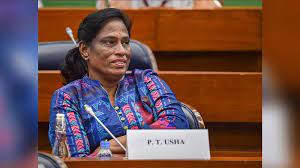Back on track: On P.T. Usha’s appointment as Indian Olympic Association president
P.T. Usha can create a road map for India’s bid for the Olympics in the 2030s
Decades ago, when P.T. Usha travelled by the Madras-Mangalore Mail, her employers, the Railways, permitted an unscheduled stop at her hometown Payyoli in North Kerala. Such was the respect she garnered for her medal-winning exploits at the Asian level while the collective heart-break she bequeathed in narrowly missing a bronze in the 400m hurdles at the 1984 Los Angeles Olympics is remembered even today. After she retired from track-and-field, she evolved as a coach, groomed fresh talent and kept an eye on the grassroots. Her latest appointment as president of the Indian Olympic Association (IOA) comes with a surfeit of goodwill. Additionally, it busts the patriarchy inherent in many sports hierarchies across India. She becomes the first woman president of the IOA, a post she was elected to unopposed. In a sense the IOA’s hand was forced as factionalism drew censure from the International Olympic Committee and there were whispers of a ban. A change of guard from the earlier well-entrenched lobby with political links was inevitable and Usha was seen as the ideal candidate. Already a nominated Rajya Sabha member, Usha’s latest sporting elevation was seen as an organic progress. Having handled many batons while running her famous relays, Usha will find the latest one perhaps the toughest to manoeuvre.
As the umbrella organisation for sports bodies in India, the IOA has to deal with sister associations lost in dissidence. Stadiums become white elephants, leased out for housing loan expos or music concerts. Age-fudging and doping are grim realities as young athletes, seeking jobs, chase medals at the zonal, age-group and national levels. Medals often secure a career opening in public sector units, banks and a few corporates and Usha is aware of this. She and her team of administrators that includes sportspersons and other officials, need to crack the whip. For all the political jostling that happens during the elections, men and women representing opposite ideologies shake hands and become entrenched in sports administration, seeking brownie points and fame. The Government’s leaning on the soft power of sports, the Sports Authority of India’s initiatives and corporate-backed academies have changed the landscape. India is beginning to aspire for golds beyond the Asian realm and Neeraj Chopra and Abhinav Bindra’s exploits in the Olympics are a pointer that the skill-sets are there and if support is provided, medals with better lustre can be secured. With India hoping to bid for the Olympics in the 2030s, Usha and her team are expected to create a road map for that too. The Payyoli Express has a tough challenge ahead.
